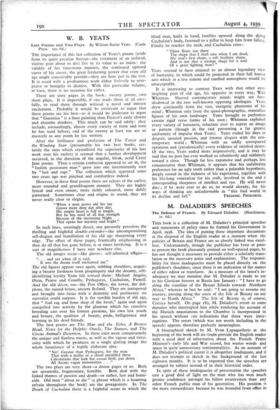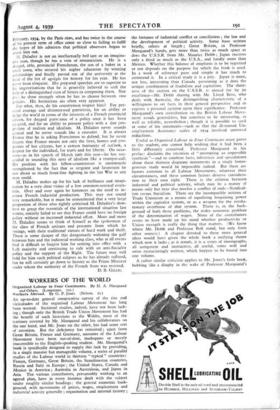M. DALADIER'S SPEECHES THIS book is a collection of M.
Daladier's principal speeches and statements of policy since he formed his Government in April, 5938. The idea of putting these important documents at the disposal of the English reader at a moment when the policies of Britain and France are so closely linked was excel- lent. Unfortunately, though the publisher has been at pains to present the book pleasantly printed on well-spaced pages, he has not thought it necessary to provide either a scholarly trans- lation or the necessary notes and explanations. The responsi- bility for these inadequacies must be placed directly on the publisher's shoulders, since there is no indication of the names of either editor or translator. As a measure of the latter's in- adequacy we may mention that M. Daladier is made to say to his Corsican hearers at Bastia last January : " I have to go along the coastline of the Beaute Islands towards Northern Africa," whereas in fact he said : " I am going to resume my journey, passing along the coast of the Isle of Beauty on my way to North Africa." The Isle of Beauty is, of course, Corsica herself. On page 583, M. Daladier's retort to some deputies who interrupted him while rendering his account of the Munich negotiations to the Chamber is incorporated in his speech without my indications that there were inter- ruptions. The retort (which was not worth including in the speech) appears therefore perfectly meaningless.
A biographical sketch by M. Yvon Lapaquellerie at the beginning of the book will no doubt provide the English reader with a good deal of information about the French Prime Minister's early life and War record, but wastes words and space in quite unnecessary sentimentalities. As an account of M. Daladier's political career it is altogether inadequate, and it does not attempt to sketch in the background of the last eighteen months. It is to be regretted that the speeches are arranged by subject instead of in their historical order.
In spite of these inadequacies of presentation the speeches cast a good deal of light on the man who has won much greater confidence amongst his fellow countrymen than any other French public man of his generation. His position is the more extraordinary because he was hounded from office in February, 1934, by the Paris riots, and has twice in the course of his present term of office come so close to failing to .fulfil the hopes of his admirers that political observers began to count him out.
M. Daladier is not an intellectually bril iant or an imagina- tive man, though he has a vein of romanticism. He is a dogged, able, provincial Frenchman, the son of a baker in a small town, who secured his higher education by winning scholarships and finally passed out of the university at the head of the list of agriges for history for his year. He has never been eloquent. His prepared speeches are so superior to his improvisations that he is generally believed to seek the help of a distinguished man of letters in composing them. Nor doe; he show strength when he has to choose between two policies. His hesitations are often very apparent.
For what, then, do his countrymen respect him? For per- sonal courage and disinterested patriotism, for an ability to ju ige the world in terms of the interests of a French provincial citizen, for dogged purstance of a policy once it has been adapted, and for an ability to present policy with a due pro- portion of realism and idealism. M. Daladier never sounds cynical and he never sounds hke a crusader. It is always France that he is asking Frenchmen to defend, but he never forgets that France means not only the lives, homes and pro- perties of her citizens, but a certain humanity of outlook, a respect for the individual, for truth and for liberty. On oci3- sion—as in his speech of March 29th this year—he has suc- ceeded in sounding this note of idealism like a trumpet-call. His position with his fellow-countrymen is enormously strengthened by the fact that as sergeant and lieutenant he saw about as much front-line fighting in the last War as any man could.
M. Daladier makes up for his lack of brilliance and imagi- nation by a very dear vision of a few common-sensical essen- tials. Over and over again he hammers on the need to in- crease French industrial production. This may not sound very remarkable, but it must be remembered that a very large proportion of those who rightly criticised M. Daladier's slow- ness to grasp the essentials of the international situation last winter, entirely failed to see that France could have no foreign policy without an increased industrial effort. More and more M. Daladier seems to think of himself as the spokesman of the class of French artisans and peasants from which he springs, with their traditional virtues of hard work and thrift.
There is some danger of this dangerously widening the gulf between him and the industrial working class, who at all events find it difficult to forgive him for coming into office with a Left majority and continuing to rule with an anti-Socialist policy and the support of the Right. The future may well hold for him such political eclipses as he has already suffered, but he will certainly go down to history as the Prime Minister under whom the authority of the French State was restored.
D. R. GILLIE.









































 Previous page
Previous page